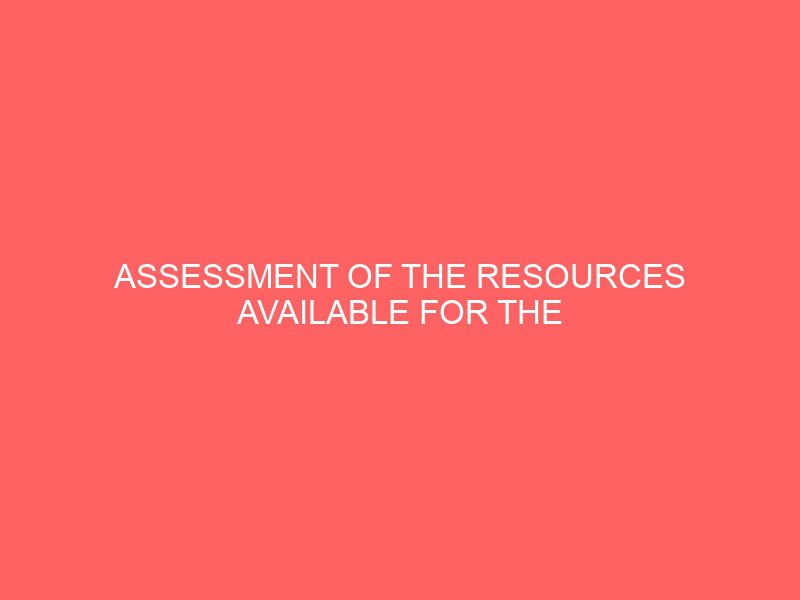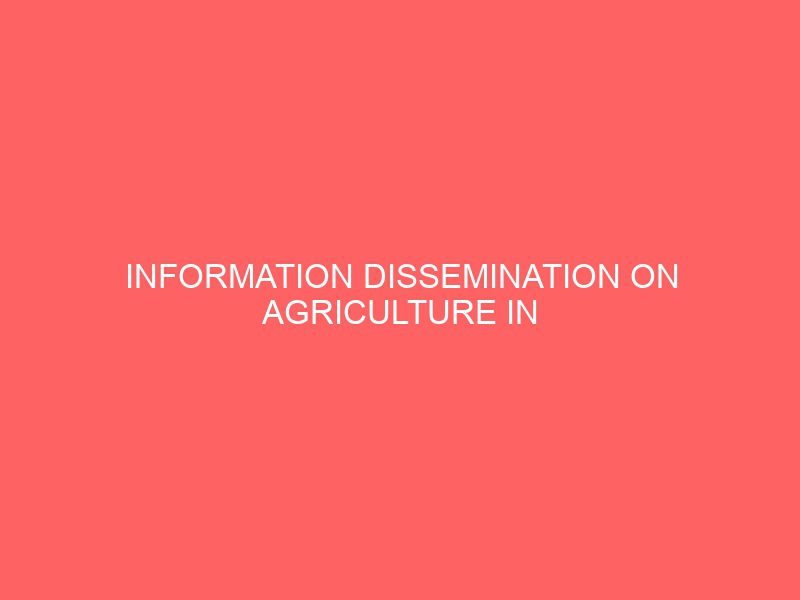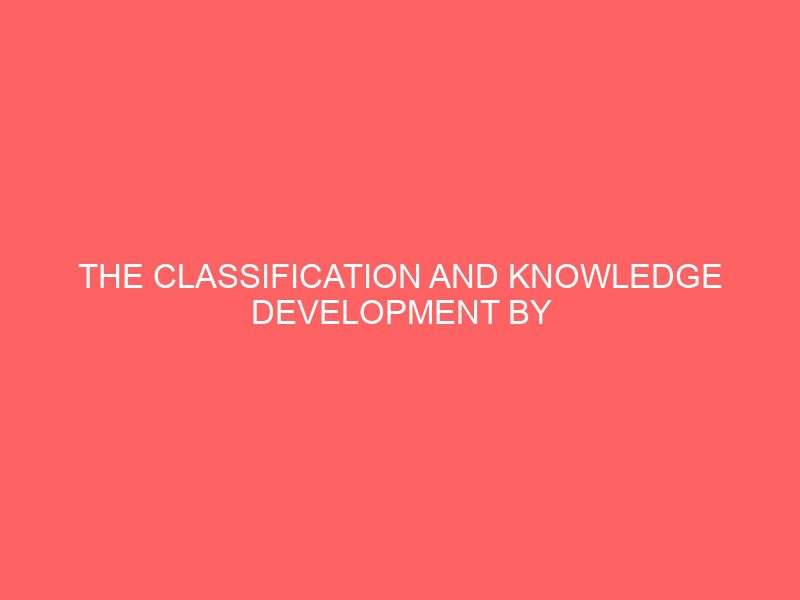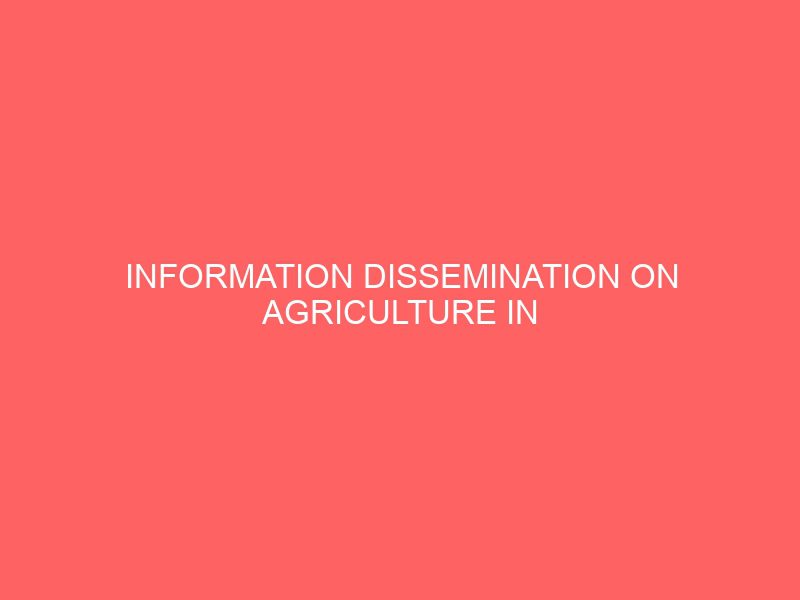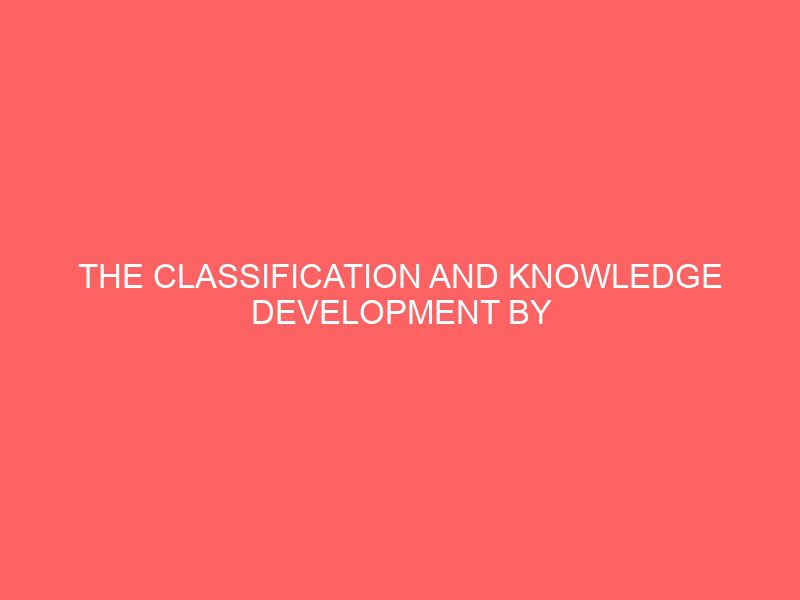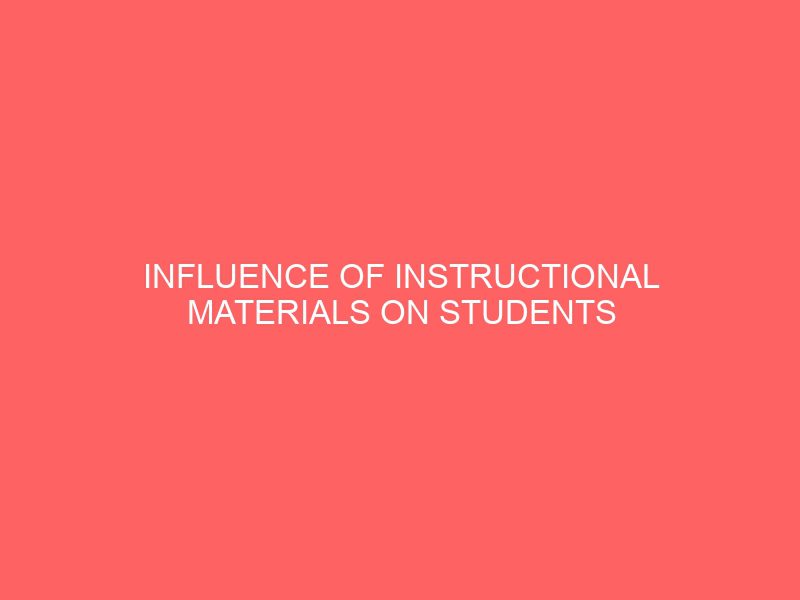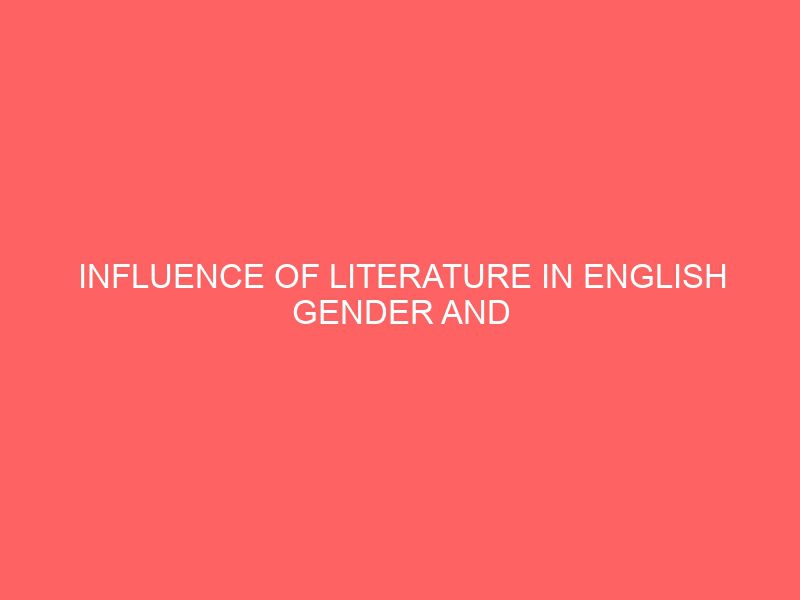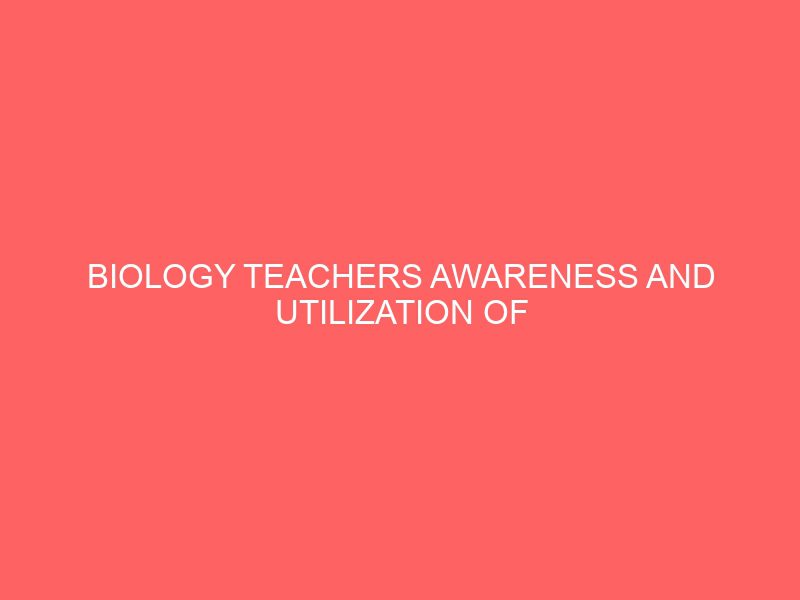CHAPTER ONE
1.0 INTRODUCTION
1.1 Background to Study
The English Language was introduced into many countries through colonization among other factors. As early as the beginning of the 19th century, English language had become the language of trade, contact and missionary endeavour. Countries such as Nigeria and Ghana use it as a means of communication nationally and internationally. Within these geographical region, the English language acts as medium of instruction from the primary school up to tertiary level. English language is spoken around the globe and it has a wider dispersion than any other language.
A teacher is a very significant factor in the school environment as well as the materials he uses to drive home his/her point. These materials used by the teacher tend to have a significant implication which cannot be dismissed with a wave of hand if academic excellence is to be achieved in our education institution. In order to achieve these educational goals, the use of instructional materials cannot be over-emphasised.
Instructional materials are materials which assist teachers to make lesson explicit to the learners. They also transmit information, ideas and notes to learners Ijaduola (1997), Aina (1982) asserts that instructional materials are those materials or resources used in any teaching exercise to promote greater understanding of the learning experience. They are used to provide the richest possible learning environment which helps the teacher and learners to achieve specific objectives. They also assist the teachers to communicate more effectively and the learners learn more meaningfully and permanently. The same is amplified by Ogunsanya (1984) who describes teaching materials as anything that helps the teacher to promote teaching and learning activities.
Sharing the above view, Kay (1981) defines them as things which are intended to help the teacher to teach more effectively or better still which enables the pupils to learn more easily. In the opinion of Ajelabi (2000) and Akinlaye (1997) many educational technologist see instructional materials as devices and resources used in learning situation to supplement to written or spoken words in the transmission of knowledge, attitude, ideas or concept and values. Akinlaye (1997) further states that thy have been defined as things or objects brought into play to emphasize, clarify, strengthen, vitalise the teachers instruction. Ajelabi (2000) subtly puts instructional materials as teaching-learning materials that constitute an integral component of classroom instructional process which are utilized in delivering educational information to the learner. He further states that it makes lesson real, concrete and effective. Learners are motivated to learn at their own pace, rate and convenience.
Since English language came to Nigeria, it has assumed many roles especially in educational circle. The English language is divided into many parts in the school like orals, lexis and structure, comprehension, essays. It is an important subject that must be compulsorily be credited before gaining admission into tertiary institution. The importance of this subject makes it necessary that teaching materials should be used for effective learning. Macaulay J. I. (1989) asserts that visual aids make lesson come alive and help students to learn better. He further states that an ample provision of visual and general teaching materials is an evidence of teachers? preparedness for the lesson. Ehizojie (1989) summarises the importance of instructional materials further ?One of the ways of relaxing in the classroom atmosphere, motivating the students and teaching English creatively and interactively in through the use of audio-visual and other teaching aids. This is because well selected/well planned and produced audio-visual:
– arouse the learners interest
– kindle imagination
– stimulate active participation and involvement in a lesson
– help memory and recall
– relate learning to real life
– can stay in view as long as the teacher wishes
National policy on Education (1998 revised) states that instructional materials should be concept centred, activity based and work related.
Instructional materials include both visuals and audiovisuals such as pictures, flashcards, posters, charts, tape recorder, radio, video, television, computers among others.
These materials serve as supplement to the normal processes of instruction.
1.2 Statement of Problems
The act of teaching is fundamentally concerned with passing ideas, skills and attitude from the teacher to the learner.
In Nigeria, for example experience has shown that spoken words alone in the communication of ideas are grossly ineffective and inefficient in producing desired learning outcomes.
Every year, when the results of public examination are released, there has always been mass failure in English language. There are parts of English language that pose problem of comprehension to students especially poetry and grammar. These cannot be taught effectively without instructional materials.
Mutebi and Matora (1994) indeed affirmed that we learn and remember 10% of what we hear, 40% of what we discuss with others and as high as 80% of what we experience directly or practice. This contention is underscored by the often quoted age old Chinese deduction
What I hear, I forget
What I see, I remember
What I do, I know
1.3 Purpose of Study
The purpose of this study is to identify the problems responsible for students? poor performance in English language. The purpose includes:
i. To examine the influence of the sue of instructional materials on the teaching of English language in secondary schools
ii. To ascertain the extent to which secondary school student?s learning of English language can be influenced by the use of instructional materials
iii. To determine whether there will be any difference in the performance of secondary schools students in English language due to the use of instructional materials.
1.4 Research Questions
In order to achieve the objectives of this study, the following research questions were generated to guide the investigation:
i. Will the use of instructional materials influence the teaching of English language in secondary schools?
ii. To what extent can secondary school students learning of English language be influenced by the use of instructional materials?
iii. Will there be any difference in the performance of secondary school student in English language due to the sue of instructional materials?
1.5 Research Hypotheses
The following null hypotheses were formulated and tested during the study.
i. The use of instructional materials will not have significant influence on the teaching of English language in secondary schools.
ii. The use of instructional material will not have significant positive influence on secondary school students? learning of English language.
iii. There will be no significant difference in the performance of students in English language due to the use of instructional materials.
1.6 Significance of Study
The use of audio-visual in the classroom is at present strong emphasized. The use of instructional materials will give the learner opportunity to touch, smell or taste objects in the course of teaching and learning encounter. It is necessary therefore to see that knowledge passed unto the students at different level of educational instruction are well planned and meaningful. Hence the researcher intends to point out the relevance of this study to the following: students, teacher, curriculum planners, educational system and society at large.
To the students, if there is effective use of instructional materials, the students should be able to learn effectively and also retain what they have learnt.
Nwadinigwe (2000) asserts that ?learning is a process by means of knowledge, skills, habits, facts, ideas and principles are acquired, retained and utilized. The only means of achieving this is through the use of instructional materials.
The study will be of benefit to the teachers because there will be increase in productivity if effective teaching and learning takes place.
Ekwueme and Igwe (2001) say, ?It is only the teachers who will guarantee effective and adequate usage of instructional material and thereby facilitate success. Consequently a teacher of English language who makes use of appropriate instructional materials to supplement his teaching will help enhance quick and creative thinking, sharpen students? imagination and this helps the learners to be spontaneous and enthusiastic. Oremeji (2002) asserts that any teacher who takes advantage of these resources and learns to use them correctly will find that they make almost an incalculable contribution to instruction. He further says that these resources can be used not only at the level of the school system but also fitted into any teaching situation just as naturally on printed material. He says that they are of high value in importing information, clarifying difficult and abstract concepts, stimulating thought, sharpening observation, creating interest and satisfying individual difference.
Aina (1982) and Ogunsanya (1984) support Orameji?s (2002) assertion by saying that the use of instructional material for teaching enriches the classroom work and contributes directly and indirectly to effective teaching and learning.
Richmond (1970) puts the importance more succinctly noting that they make learning more meaningful, focussing on pupils? interest and attention, simulate learning, encourage expression and help visualization and provision of a sensory contact with realities.
The educational system and society at large will also benefit from the study because when the teachers solidify their teaching with instructional materials and the learners learn effectively, the knowledge acquired will reflect in the society positively. Students speak and communicate better at home and in their place of work. The standard of education will also improve. The mass failure in English language will also be minimized.
1.7 Scope of the Study
The study investigated the influence of instructional materials on students? performance in English language. Due to the vast and universal nature of this study, the researcher concentrated on Bariga and Yaba Local Government Area of Lagos State. The study involved students in Junior Secondary School II (JSSII) from four randomly selected schools. The schools are:
*CMS Grammar School, Bariga
*Our Lady of apostles Secondary School, Yaba
*Stockbridge Secondary School, bariga
*Federal science and Technology Colege, Yaba
1.8 Limitations of Study
The major factor that constituted a limitation to this study was the insincerity of the respondents in supplying appropriate information required of them in relation to their personal data, socio-economic and educational background. Besides, insufficient fund to take the researcher to vast areas like Lekki and Ikorodu areas limited the wider coverage of the study. Time constraint also posed a limitation to the study.
Finally, incessant power failure circumspect the researcher?s ability to get adequate necessary information from the internet, which in turn cushioned the volume of the literature reviewed during the study.
Definition of Terms
Effect: This is the way in which an event, action or person changes someone or something.
Instructional Material: What the teacher uses to make the lesson more interesting and understandable.
Performance: This has to do with the ability to do something or carrying out an activity





